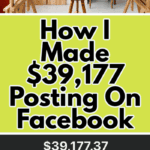Did you know Facebook pays people just for posting content? Even for things like memes, screenshots, and everyday photos? Today, I’m excited to share an interview with Jeff Rose, a content creator who has made over $149,000 in just six months by posting on Facebook. I’ve known Jeff for years, and I’ve even been featured…
Did you know Facebook pays people just for posting content? Even for things like memes, screenshots, and everyday photos?
Today, I’m excited to share an interview with Jeff Rose, a content creator who has made over $149,000 in just six months by posting on Facebook. I’ve known Jeff for years, and I’ve even been featured on his YouTube channel – so when I saw what he was doing and how much he was earning from Facebook, I knew I had to learn more.
It all started with a surprise $137 payout he didn’t even know was possible. Now, he earns thousands each month by sharing photos, memes, and funny or relatable posts – and in one month alone, he made $39,177.
I think this may be one of the most exciting ways to make money right now, and I’m actually trying it myself on my own Facebook Page as well!
If you’ve ever scrolled through Facebook wondering if it’s “dead” or missed the window to earn online, this interview shows that there’s still a huge opportunity, even for beginners.
In this interview, you’ll learn:
- Why Facebook pays creators just for posting
- How to earn money with pictures, memes, and even text posts
- How he grew from 30,000 to 355,000 followers in under a year
- What it takes to earn $39,000+ in one month from Facebook
- Tips for beginners who want to get started now
- Mistakes to avoid if you’re new to Facebook Monetization
- And more!
If you’re looking for a fun, low-effort way to make extra money online, this is one interview you don’t want to miss.
I also recommend signing up for the Get Paid To Post course by Jeff Rose. When I saw how much Jeff was earning just from posting content on Facebook – with no products, no clients, and no big audience – I bought the course right away. Inside, you’ll learn how to qualify for Facebook’s Monetization program, find content that performs, and use simple tools to schedule everything in just a few hours a week. If you’re already posting online (or want to start), this course is the perfect way to turn it into income.
How I Got Paid $39,177 Directly From Facebook in One Month Just To Post Content
This interview is for you if you want to learn how to make money by posting on Facebook.
1. Can you tell us a little about yourself and how you first got started posting on Facebook? What led you to learn that Facebook would actually pay you for posting? Did you stumble upon it or go looking for a way to monetize?
I’ve had my Facebook Page since 2009. Back then, it was just a way to push people over to my blog. For years, that’s all I used it for, and honestly, Facebook became the platform I cared about the least. I kept the Page alive mainly to share a blog post, promote a YouTube video, or support a brand deal.
Then last year, my wife relaunched her Instagram and started learning how to grow. Watching her inspired me to take Instagram more seriously, too. I committed to posting at least one reel a day, sometimes two. Since my Instagram was connected to my old Facebook Page, I figured I might as well crosspost the reels. It took no extra effort, and I had no plans to grow on Facebook. At that point, I actually thought posting there was a waste of time.
That’s when something unexpected happened. One of my reels on Facebook blew up, hitting several hundred thousand views. Meanwhile, my Instagram Reels weren’t getting any traction at all. That surprised me. I didn’t make money on that video because it used copyrighted music, but it forced me to look at Facebook differently.
Not long after, I shared a simple picture. Nothing special. For some reason, it got good engagement. I didn’t think much of it until I logged into my dashboard and saw I was set to earn $137 for that one post. That was part of Facebook’s old Performance Bonus program, which has since been rolled into the current Content Monetization program.
The funny thing is, I don’t even know how I got into the program. I never applied or accepted anything. It just appeared, and suddenly I was getting paid for a picture.
I wasn’t out there looking to make money on Facebook, and I didn’t even know it was possible. But that $137 was the moment I realized something bigger might be going on.
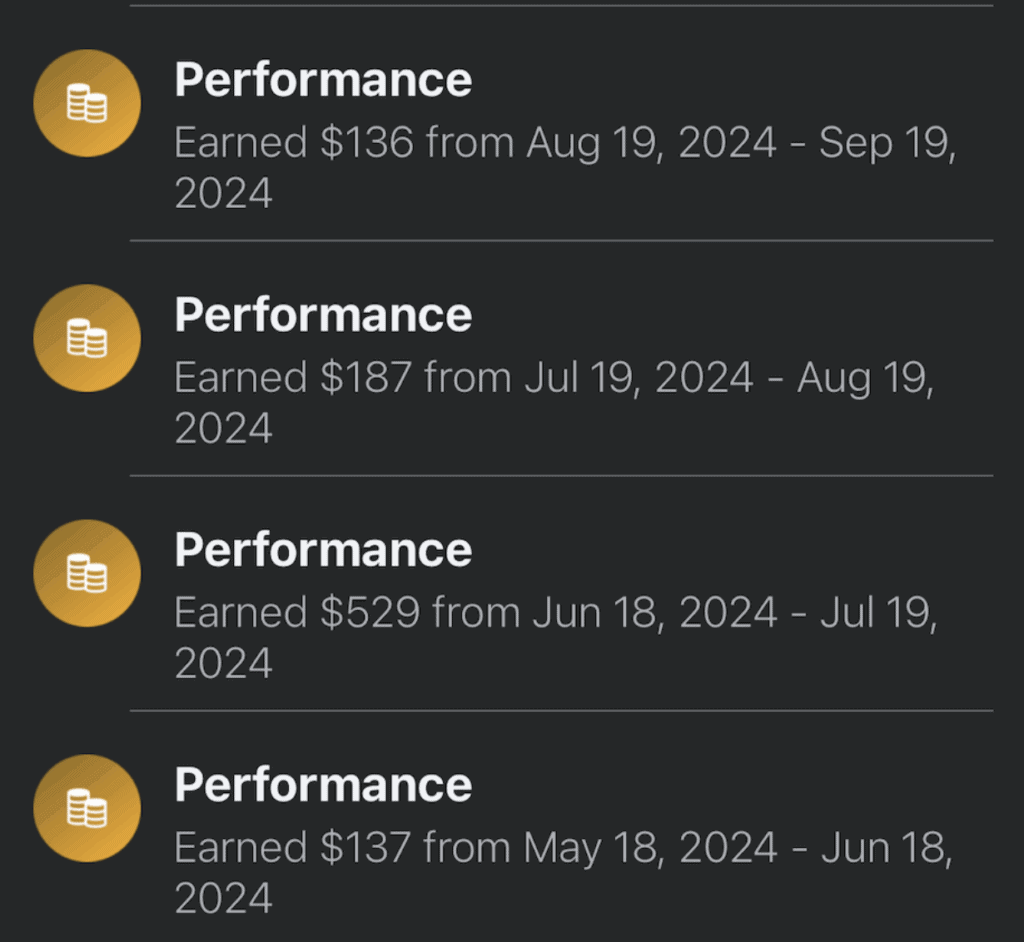
2. What was your first payout like, and how did that feel? How much money have you made by posting on Facebook?
My first payout was $137. The second one was $529. After that, I had a couple smaller ones, just a little over a hundred bucks each. At that stage, I knew Facebook would actually pay me, but I still didn’t see it as anything more than a little side bonus. It didn’t feel like some big opportunity yet.
That changed about seven months later. I kept experimenting and finally had my first four-figure month, just under $5,000. That was the moment I started realizing this was bigger than I thought.
Of course, it wasn’t all smooth sailing. In early 2025, my Page got flagged because I shared a funny meme that was clearly satire, but Facebook fact-checked it and suspended my account for a bit. I was more annoyed than anything, so I basically wrote the whole thing off and shifted my focus elsewhere.
It wasn’t until April of this year that I came back to it and decided to really take it seriously. And that’s when things clicked. From April through September, I’ve made over $149,000 just from posting content on Facebook.
What started with a $137 surprise payout has turned into something I never would’ve imagined.
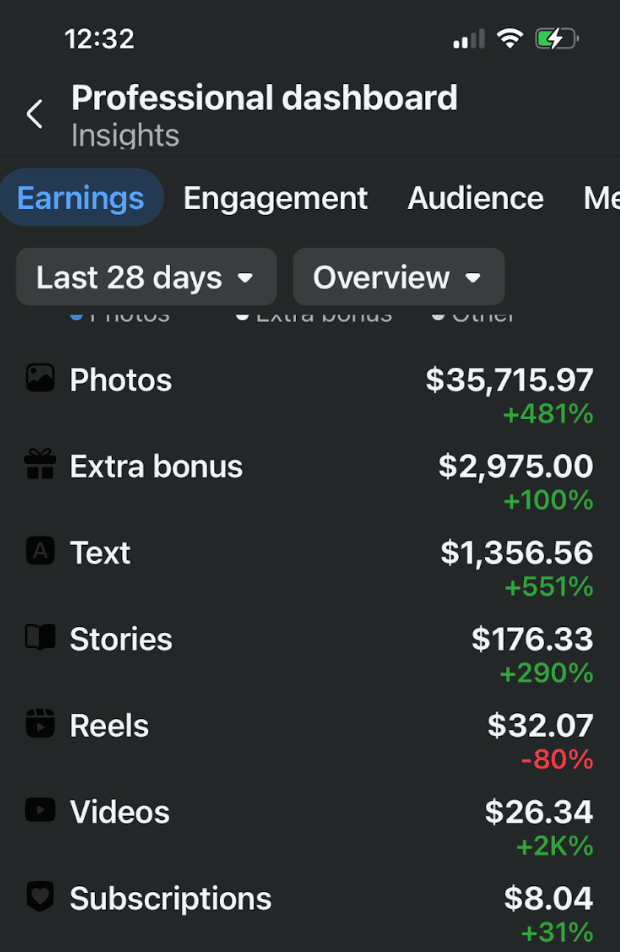
3. For someone who’s never heard of Facebook paying creators, can you explain in easy terms how it works? Are you literally just posting on Facebook and Facebook is paying you? Why does Facebook pay creators? Do you have to post videos?
I know, it sounds wild. It’s one of those situations where you want to assume the math isn’t mathing, but in this case, it actually does. Facebook really will pay you just for posting content. And it still blows my mind.
When I first started, they were only paying for reels through something called Ads on Reels. They also had a separate program called the Performance Bonus program that covered pictures and text posts. Those have since been rolled into what’s now called the Facebook Monetization program. Under that umbrella, you can make money from reels, photos, text posts, memes, stories, and even subscriptions.
Now, subscriptions are more like what you see on Patreon – basically for your superfans who want to support you with a monthly payment in exchange for bonus content or extra access. I’ll be honest, I haven’t gone deep into that side of it, but it’s another option Facebook makes available.
The easiest way to think about it is this: Facebook wants people on the platform. The longer people stay, the more ads Facebook can run. So, when you create content that keeps people engaged, they share a portion of that ad revenue with you. That’s how creators like me are getting paid.
Do you have to post videos?
Nope. I’ve been paid for simple text posts, memes, and static images, not just video. And here’s the crazy part: Even though I’ve got years of YouTube experience, where video is king, my biggest payouts on Facebook haven’t come from video at all. I’ve actually made the most money just from posting pictures. Sometimes those pictures are nothing more than screenshots of other people’s posts that originally came from X, Threads, or even Facebook itself.
Facebook doesn’t spell out the exact formula, but based on what I’ve seen, it’s definitely tied to how many people are engaging with your content and how valuable those eyeballs are to advertisers.
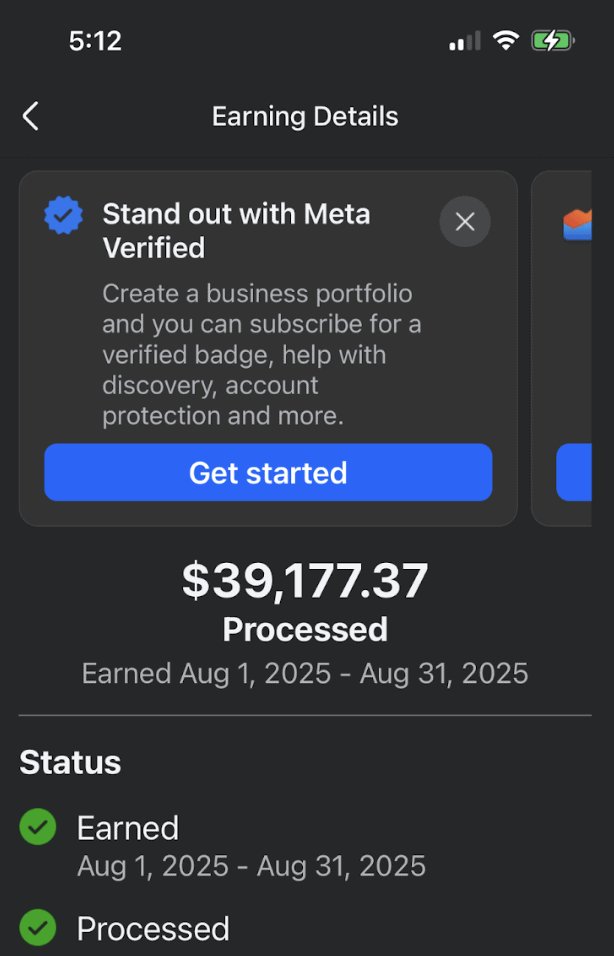
4. Can you walk us through the month you earned $39,177 – what did that look like in terms of content and effort?
One of my biggest fears early on was posting too much. I thought if I flooded people’s feeds, they’d get annoyed and unfollow me. Then I watched a YouTube video that explained only about 5% to 10% of your followers even see your posts on average. Once I understood that, it made total sense why volume mattered so much.
Up until April, I was only posting 4–6 times a day. Then I started testing: 8–12, 12–16, 16–20. By August, I ramped all the way up to 30–32 posts per day, which is when I hit that record $39,177 month.
Now, here’s the part people always ask me: “Where did you even find 30 posts a day?” I’m not sitting around trying to come up with clever ideas all day long. Most of my content is curated. I scour X (formerly Twitter), Threads, Facebook itself, Reddit, and even news publications for posts, screenshots, or ideas I can share. About 90% of what I publish is pictures, with a few text posts and the occasional reel sprinkled in.
To manage all of that, I use Buffer. I’ll block off two to two and a half days a week to schedule everything, then I can basically set it and forget it. That’s the beauty of it. Two focused days of work translated into nearly $40,000 that month. Not bad for content I was mostly repurposing from places I was already scrolling anyway.
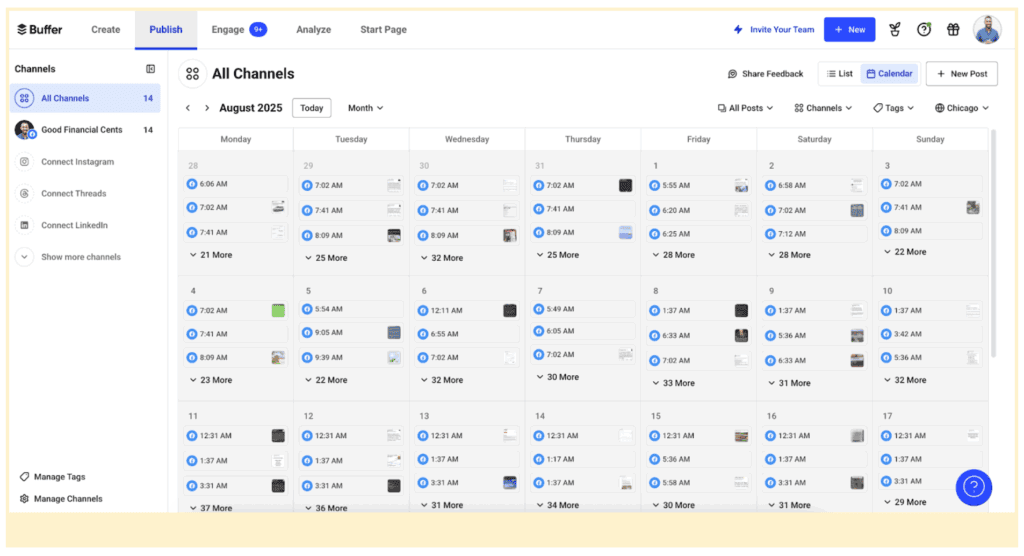
It sounds like a lot – and honestly, I resisted posting that much for the longest time. But when I looked at other successful pages, I noticed the same pattern: High frequency equals high growth. That $39,177 payout was the proof that consistency and volume are what Facebook rewards.

5. Can you share a specific example of a post that performed really well?
I’ll share two examples. One is one of my highest-earning posts, and the other isn’t close to the top in terms of revenue, but it shows how even the most random everyday moments can turn into money.
The first one was about Buc-ee’s, the gas station. And listen, I’m obsessed. I can’t drive by a Buc-ee’s without stopping. Their brisket sandwiches and roasted almonds are unreal. So when I shared a post about the origin story of Buc-ee’s, I had a pretty good feeling it would hit. And it did. That single post reached over 18 million people, pulled in more than 269,000 interactions, and earned me $3,390.
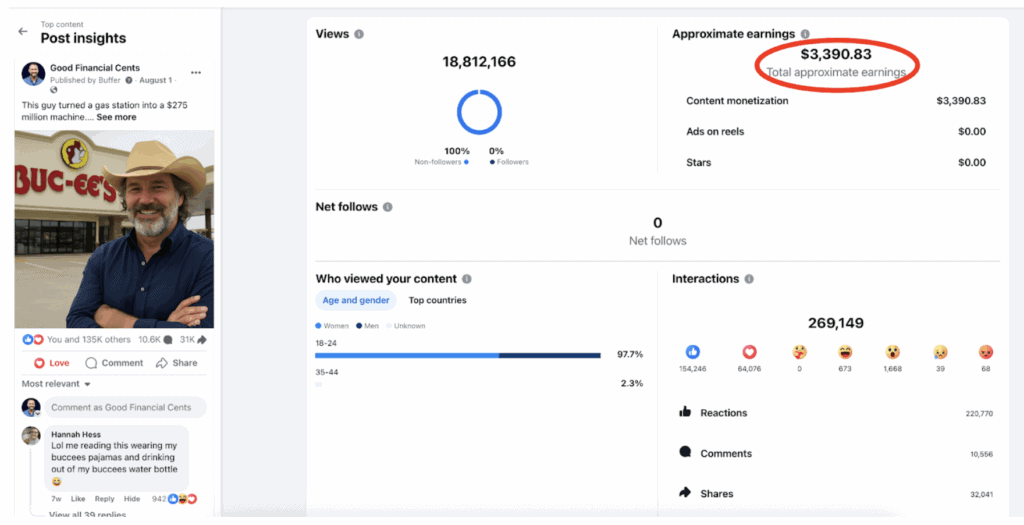
The wild part? One hundred percent of that reach came from people who weren’t even following my Page. That’s the kind of thing that makes you realize how big this opportunity really is – you don’t need millions of followers to make serious money.
The second example is just funny. I was traveling for a basketball tournament with my middle son, and one morning we hit IHOP. We were starving and ordered way more food than we could finish. I snapped a quick photo of the receipt and threw it up on Facebook.
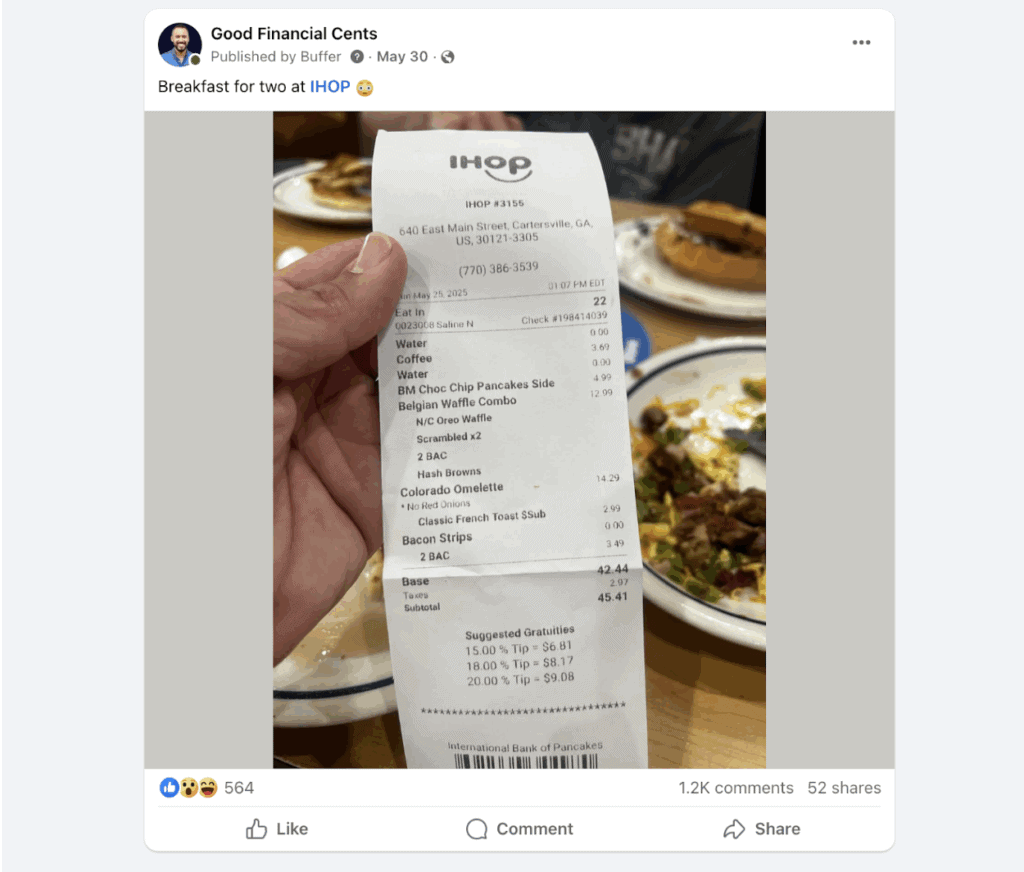
That one ended up making over $250. Not only did it pay for our breakfast, it could have covered about five more trips to IHOP. And honestly, after that meal, I was in a full-on syrup coma, but at least I knew Facebook had my back.
That’s what I love about this. You can go from a post about a billion-dollar gas station chain to a random pancake receipt, and both can turn into money. Sometimes, the content you least expect is what people engage with the most.
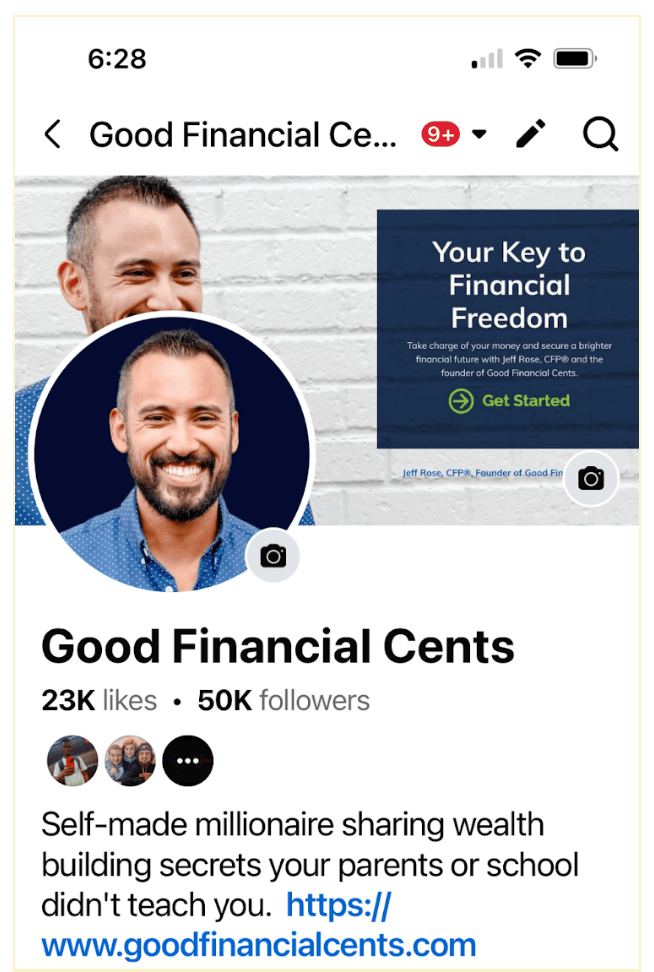
6. Do you need a big audience to qualify, or can a total beginner start?
When I really started paying attention to Facebook, my Page had about 30,000 followers. That number is a little misleading because I created the Page way back in 2009. It took me 15 years to get to 30,000. The real growth happened this year. I’ve gone from 30,000 to over 355,000 followers in just the past nine months.
Here’s the thing: You don’t need a huge audience to qualify for Monetization. My wife has a brand new page she only set up to crosspost her Instagram Reels. She’s not actively growing it, and she got invited into the Monetization program with fewer than 200 followers.
The mechanics are pretty straightforward. Facebook cares about consistency and engagement. If your posts keep people on the platform, they’ll show them to more people, often way beyond your follower count. That’s how you can go from a few hundred followers to tens of thousands, sometimes off the back of a single viral post.
Another thing most people don’t realize is that you don’t even need a separate business page to start. If you have a personal profile, you can turn on professional mode and qualify for Monetization that way. It’s one of the easiest entry points for beginners who just want to test the waters.
So no, you don’t need a massive audience. The program is designed to reward content performance, not follower count.
7. Are there certain types of audiences or niches you’ve found work better than others?
I can really only speak from my own experience, where I’ve been able to track views, engagement, and payouts. But I’ve also connected with a few other creators who were open about sharing what they’re earning.
One person I came across is in the mom and parenting niche, and they were making between $9,000 and $12,000 a month from their Facebook Page. Another was more of a lifestyle creator, and they told me they were bringing in anywhere from $15,000 to $25,000 a month. Both of these people had a few hundred thousand followers, which is in the same ballpark as my own Page.
Honestly, I was surprised when I heard those numbers. I would have assumed those niches didn’t pay as much. But seeing their results, I think it’s a good reminder that it doesn’t really matter what niche you’re in. If your content gets engagement and keeps people on the platform, monetization is absolutely possible.
8. Are there any common mistakes beginners make that people should avoid?
One of the biggest mistakes I see beginners make is assuming you can just wing it and the money will roll in. That’s not how it works.
For example, when I first got started, I had a reel blow up with several hundred thousand views, but I earned nothing because I used copyrighted music. That was a painful lesson. If you’re posting reels, make sure you’re using licensed audio; otherwise, your payout will be zero, no matter how viral it goes.
The next mistake is posting too little out of fear of annoying your audience. What I’ve learned is that only about 5% to 10% of your followers even see your posts. That’s why consistency and frequency matter. If you’re posting once every couple of days, you’re not giving yourself a fair chance.
You also have to be careful with what you post. Even something satirical or “obviously a joke” can get flagged, and Facebook doesn’t mess around when it comes to fact-checks.
And here’s one that was hard for me personally: Overcomplicating it. As a YouTuber, I’ve always been focused on making polished, high-production videos. Letting go of that mindset and leaning into simple content – like screenshots and quick images – felt strange at first. But the truth is, some of my biggest payouts have come from the simplest posts. Simple really does work.
So if you avoid those traps – copyrighted music, underposting, risky content, and overcomplicating things – you’ll be way ahead of the curve.
9. How much time does someone realistically need to spend each week to start making money by posting on Facebook?
You don’t need 40 hours. Five to ten focused hours a week is enough to start and schedule 4–6 posts per day. When people hear I made $39,000 in a month from Facebook, the first assumption is that I must be working on it full-time. The reality is very different.
On average, I spend about 2–3 days a week scheduling content using a tool like Buffer. That’s when I’ll load up 20–24 posts per day for the entire week. Once it’s scheduled, I can essentially set it and forget it.
If you’re just starting, you don’t need to commit that much. Realistically, if you can carve out 5–10 hours a week, you can get going. A few hours to find content, a few more to schedule it, and you’re done.
The beauty of Facebook right now is that it’s not about polished, high-production content like YouTube. Most of my posts are simple pictures or screenshots I’ve pulled from X, Threads, or Reddit. The work isn’t in creating cinematic videos – it’s in consistency.
So to answer the question: You don’t need 40 hours a week. You need a few focused hours to load up your content pipeline. With consistency, that’s enough to start seeing payouts.
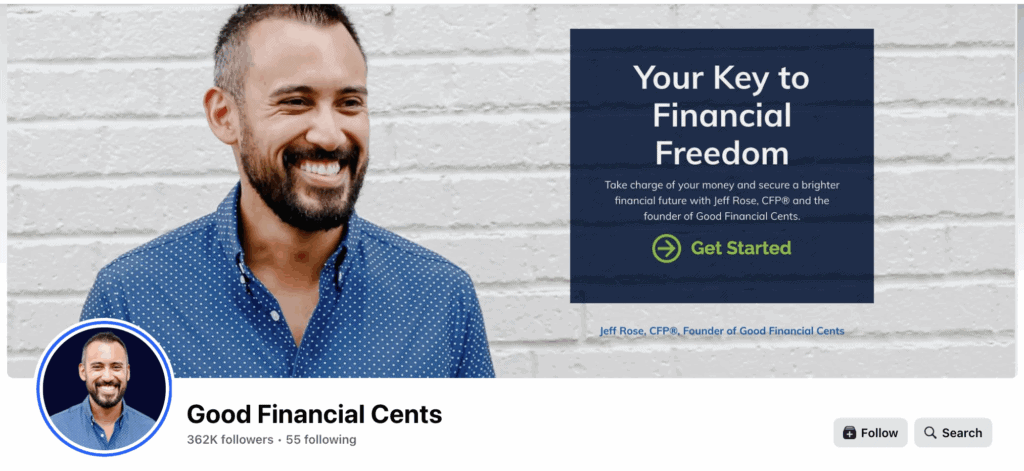
10. What would you say to someone who thinks Facebook is “dead” or that it’s too late to start?
I get why people say Facebook is dead. Honestly, I thought the same thing for years. It was the platform I cared about the least. I only kept my Page alive to drop the occasional blog post or YouTube link. I never thought it was a place where you could actually grow, let alone make money.
But here’s what flipped that belief for me. In the last nine months, my Page has grown from about 30,000 followers to over 355,000. That didn’t happen because of ads or some complicated growth hack. It happened because I started posting consistently, and the posts started getting shared way beyond my followers.
And then I started seeing what other people were doing. I just came across a guy whose entire Page is dedicated to mowing yards. That’s it. And last month, he made $47,000. To me, that says it’s not about Facebook being dead or alive. It’s about understanding how the platform works right now.
Yeah, Facebook recently rolled all their programs into one called the Facebook Monetization program, and they’re paying out across all kinds of content – reels, photos, memes, even stories. But the real story here is that it’s working for regular people in every niche you can imagine.
So when somebody says “it’s too late,” I get where they’re coming from, but I don’t agree. If a Page about mowing yards can make nearly fifty grand in a month, then clearly the opportunity is still wide open.
11. Can you give us a step-by-step process on how this works? What do people need to do to get started?
If you’re starting from scratch, here’s the simplest way to get going.
Step 1: Set up your Page.
You can either turn on professional mode on your personal profile or create a Facebook Page. Both can be monetized once you’re eligible.
Step 2: Check Monetization eligibility.
Go into your dashboard and run the check. If you’re eligible, connect your payouts right away so you’re ready when the money comes in.
Step 3: Find content.
This is the fun part. I get most of mine from X, Threads, Reddit, and even Facebook itself. Screenshots, memes, funny posts, or relatable takes all work. You don’t have to reinvent the wheel.
Step 4: Post consistently.
Start with 4–6 posts a day. As you get more comfortable, ramp up. My sweet spot now is 20–24 posts a day, and I schedule everything through Buffer so I’m not chained to my phone.
Step 5: Pay attention to what works.
Each week, check your dashboard. See which posts got the most engagement and payouts, and make more like those. Cut the ones that flop.
That’s really it. Set up your Page, turn Monetization on, post content people like, and repeat. It doesn’t have to be complicated – the biggest factor is showing up consistently.
Quick guardrails: Credit sources, avoid copyrighted audio, and steer clear of posts that could be flagged as misinformation.

12. Can you tell me more about your course? Who should buy it?
When I think about who the course, Get Paid To Post, is really for, two groups come to mind.
The first group is beginners. These are people who already enjoy posting on Facebook. Maybe it’s a hobby, maybe it’s an interest they like sharing, but it doesn’t feel like work. That’s the sweet spot, because if you’re already posting for fun, why not get paid for it?
The second group is existing content creators. If you’re already making videos on Instagram, YouTube, or TikTok, you’re putting in the effort anyway. Adding Facebook into the mix is such an easy win, especially now with the updated Monetization program. I’ve talked to so many creators who had no idea this even existed, and once they learn about it, their reaction is always, “Why am I not doing this?”
As far as what’s inside, I walk you through the whole process step by step – from setting up your Page and turning on Monetization, to finding content and scheduling everything so you’re not glued to your phone all day. Basically, it’s the exact playbook I wish I had when I started. And it’s the same system I used to go from my very first $137 payout to a $39,000 month.
So whether you’re brand new and just want to turn your hobby posts into extra income, or you’re already a content creator looking for another platform that actually pays, this course is built for you.
You can click here to learn more about my course, Get Paid To Post.
Have you ever thought about earning money from the posts you already share online? What kind of content would you post on Facebook?
Recommended reading:

